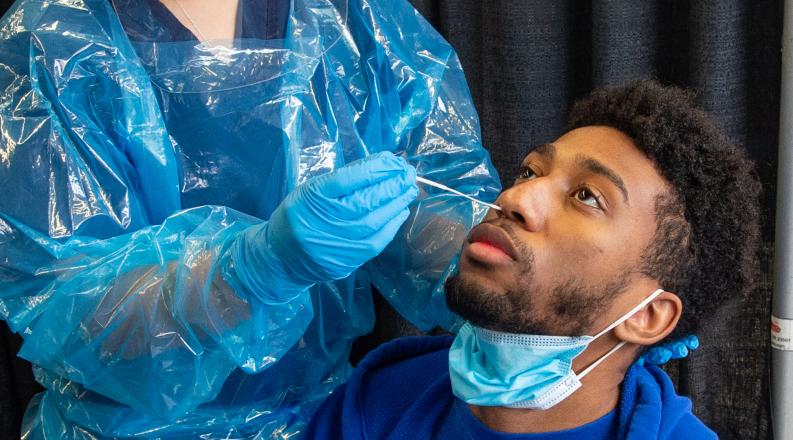By Harry Minium
Old Dominion University will dramatically increase its COVID-19 testing of students in the spring semester, conducting more than twice as many tests as it did in the fall.
Students who live on campus or attend classes in person on campus will be tested once per week as long as regional positivity rates remain high.
In addition, testing will also be offered to faculty and staff members who work on campus.
The semester opened Jan. 19 with nearly all classes online for at least the first two weeks.
"We firmly believe the testing and care we've been able to provide our students is why we were successful in the fall," said Greg DuBois, ODU's vice president for administration and finance. "In the spring, we're going to take that to another level."
In the latest round of on-campus testing, 10 of 523 students tested positive. ODU's positivity rate has been far lower than the average in Hampton Roads, Virginia and the nation.
Morris Foster, ODU's vice president for research, said the rate "has been surprisingly low compared to the rate in the general community." He said some scientific studies have indicated that living in on-campus residence halls can be safer for students than living at home or off campus.
DuBois added that ODU has strict rules for social distancing and wearing masks, limits the number of students, faculty and staff on campus and aims to quickly identify and isolate those infected with COVID-19.
In the fall, ODU set aside living space to isolate those who tested positive and another for those required to quarantine. Meals were delivered and classes were available online. Similar arrangements will be made in the spring.
"The reality is that higher education in general has been successful in creating a safe environment on their campuses," DuBois said. "That's a result of a number of factors. We've been able to test our students and get the results back quickly and care for those students who test positive. Through contact tracing, we've been able to quarantine students. ODU has its own Student Health Center and our medical professionals have cared for our students who test positive.
"Our overall protocol, from wearing masks to social distancing to limiting the size of meetings and groups to disinfecting classrooms, offices and other facilities, all contributed to why we have had such a low positivity rate relative to the surrounding community."
The increased testing in the spring was made possible because ODU invested in expanding on-campus facilities for processing results. Many colleges and universities have relied on outside sources for testing and it can take days to get those results. At ODU, it takes a few hours.
ODU relied on Sentara for testing when the pandemic began last March. But in April, ODU began ramping up on-campus facilities to begin processing tests. By the fall semester, ODU was processing all tests on campus.
ODU has a Clinical Laboratory Improvement Amendments (CLIA)-certified lab, an asset that even some medical schools lack. CLIA certification is required for diagnostic testing of human samples. ODU also has faculty and graduate students from the College of Health Sciences skilled in taking test samples and running clinical labs.
ODU conducts polymerase chain reaction (PCR) tests, considered the most accurate available.
DuBois said ODU ordered additional equipment to expand testing months ago that arrived only recently. ODU was able to process 300 samples per day in the fall and will be able to test 800 per day in the spring.
A COVID testing committee was formed in March and has met daily since the pandemic began. DuBois credits Dr. Bonnie Van Lunen, dean of the College and Health Sciences, and Foster with leading the committee and getting the testing effort off the ground quickly.
"Give credit where it's due," he said. "Morris Foster and Dean Van Lunen in particular led us to identify what we needed and to make decisions very quickly to invest in necessary equipment.
"A lot of people really stepped up and put a lot of work into making this successful."
About 3,100 students lived in residential halls in the fall semester and a similar number is expected this spring. DuBois said students are being brought back to campus gradually and tested immediately. If there is a spike in cases, ODU will pause bringing students back.
"The people we need to be identifying are those who are asymptomatic," DuBois said. "It's the people who don't know they have COVID who are the risk factor. We want to get them isolated quickly and then do contact tracing. We've been very successful in doing that."
Jared Hoernig, ODU's director of emergency management, said some ODU staff have received the COVID-19 vaccine, mostly health-care providers, housekeeping staff and those collecting COVID samples.
"We have discussions underway with the Virginia Department of Health with the goal of getting every member of the University community vaccinated," he said. But he added that because of the shortage of vaccines, that will take months.
ODU took great care to make classrooms as safe as possible. Class sizes were reduced, and students were located at least 6 feet apart. Faculty wore face guards and students wore masks on campus, even when walking outside from one building to another.
"This entire process has been a challenge for the University, but it's an excellent example of cooperation and teamwork with everyone who's been involved," Hoernig said.
Don Stansberry, vice president of student engagement and enrollment services, said ODU students deserve praise for acting responsibly, including completing a daily COVID-19 check-in online that's required before attending class. ODU faculty and staff must do the same daily check-in, which documents whether you have COVID symptoms or have been tested for the virus.
"We couldn't have stayed open until Thanksgiving without the students cooperating and our students holding each other accountable," Stansberry said. "Were there days when our students forgot their masks? Yes. But they would go back and get them. They wanted to be here, and they knew being here depended on them. They really stepped up."
DuBois said that students who choose to take classes from home rather than live on campus won't be charged for room or board.
"We are passionate about our students," he said. "We are here to educate them and do everything we can to provide a healthy and safe living and learning environment. Investing in increasing our testing capacity even more helps us achieve this goal."
Click here to see a list of classes that will be offered in person starting Feb. 1.






